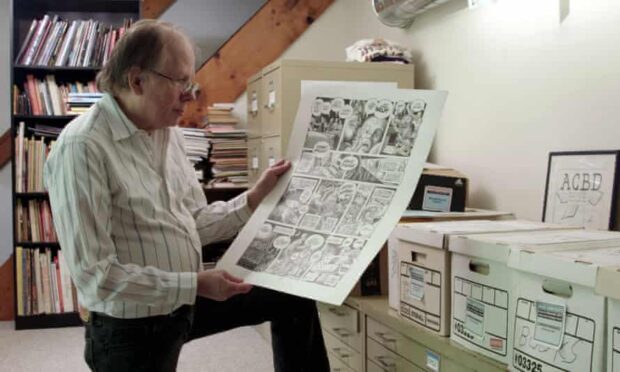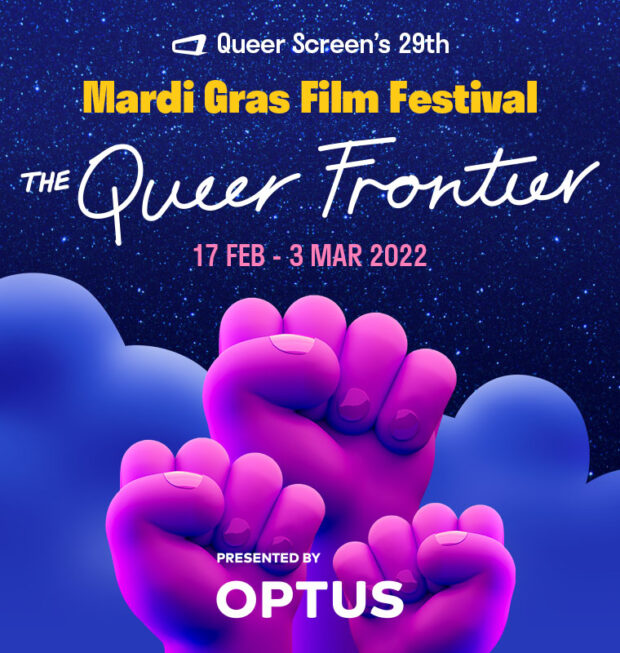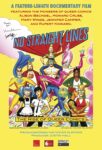Everybody knows the Bechdel Test. It’s the one that asks whether a work features a scene where at least two women talk to each other about something other than a man. Some even say that about half of all films fail the test. What fewer people know is that the test comes from a 1985 instalment of the Alison Bechdel’s long-running comic strip Dykes to Watch Out For.
Which is what Vivian Kleiman’s film wants us to know more than anything. That you should know your history, especially when its as long and illustrious — albeit often hidden — as the story of queer comics. Taking a leaf out of Justin Hall’s comic book anthology, NO STRAIGHT LINES: THE RISE OF QUEER COMICS profiles five creators: Alison Bechdel (Fun Home), Jennifer Camper (Rude Girls and Dangerous Women), Howard Cruse (Gay Comix), Rupert Kinnard (B.B. And The Diva) and Mary Wings (Come Out Comix).
Sort of like the LGBTQIA+ version of Comic Book Confidential (1988), Kleiman takes us on a potted history of queer comics, from the underground to the mainstream, through the eyes of these pioneering talents. From the complete absence of representation to the rise of underground comix, early works like Come Out Comix (in 1973) offered an alternative to the likes of the more notorious Robert Crumb. Soon gay street press and other newspapers provided wider syndication to marginalised voices. In the era of another pandemic, works like 7 Miles a Second (from David Wojnarowicz and James Romberger) and Howard Cruse’s Wendell gave voice to a generation most impacted by HIV/AIDS.

Where the material comes alive is through the stories and interviews of artists, creators and those influenced by the works in later generations. When Rupert Kinnard introduced the Brown Bomber (or B.B.) in 1977, it was the first serialised Black queer character to appear. Yet for some the material remained hidden. “These are new roots for me,” reflects Taneka Stotts, Emmy nominated story editor of works like Stephen Universe and the Eisner-nominated Déjà Brew. Cartoonist Lawrence Lindell sums it up nicely: “How many other Ruperts are there that I don’t know about?”
Through interviews with the featured creators and so many who came before, during and after — including but not limited to Ajuan Mance (1001 Black Men), Maia Kobabe (Gender Queer), Breena Nuñez (Be Gay, Do Comics!), Sina Grace and Nicole Georges (Invincible Summer) to name a few — we learn about how many gems are still out there, and which ones are more visible than they used to be. Some creators speak about the broader history of their stories, while others (especially Bechdel and Cruse) go deep into their process. If nothing else, we get some pretty impressive reading lists to go on with.
The film ends on some massively optimistic notes, including the impressive heights Bechdel’s Fun Home has reached and the Tony Award winning musical it inspired. As the latter tours around the world, including Australian stints in 2021 and 2022, we see how these stories have come a long way from their underground roots. NO STRAIGHT LINES is a terrific document that shines a light on some very important creators. Oh, and the film very much passes the Bechdel Test.

2021 | USA | DIRECTOR: Vivian Kleiman | CINEMATOGRAPHY: Andrew Black | EDITOR: Christiane Badgley, Linda Peckham | CAST: Alison Bechdel, Jennifer Camper, Howard Cruse, Rupert Kinnard, Mary Wings | DISTRIBUTOR: The Film Collaborative, Mardi Gras Film Festival 2022 | RUNNING TIME: 89 minutes | RELEASE DATE: 17 February – 3 March 2022 (AUS)

